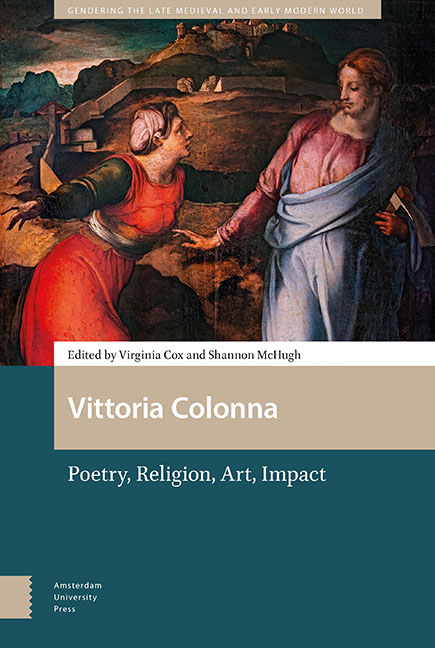Book contents
- Frontmatter
- Dedication
- Contents
- List of Illustrations
- Acknowledgements
- Introduction: The Twenty-First Century Vittoria Colonna
- Part 1 Literary and Spiritual Sociability
- Part 2 Widowhood
- Part 3 Poetry
- Part 4 Art
- Part 5 Readership
- Part 6 Impact
- Volume Bibliography
- Index of Citations of Colonna’s Letters and Verse
- Thematic Index
14 - ‘I Take Thee’: Vittoria Colonna, Conjugal Verse and Male poeti colonnesi
Published online by Cambridge University Press: 16 December 2021
- Frontmatter
- Dedication
- Contents
- List of Illustrations
- Acknowledgements
- Introduction: The Twenty-First Century Vittoria Colonna
- Part 1 Literary and Spiritual Sociability
- Part 2 Widowhood
- Part 3 Poetry
- Part 4 Art
- Part 5 Readership
- Part 6 Impact
- Volume Bibliography
- Index of Citations of Colonna’s Letters and Verse
- Thematic Index
Summary
Abstract
It is widely known that Vittoria Colonna influenced female love lyricists, as well as spiritual Petrarchists of both genders. Generally unrecognized is the impact her amorous verse had on male love poets. This chapter traces Colonna's impact via the Petrarchan sub-tradition of ‘conjugal verse’, or poetry for one's spouse: first on Pietro Bembo; then on Neapolitan widowers in her cultural sphere (Bernardo Tasso, Berardino Rota); and down through a line of husband poets stretching to the early years of the seventeenth century. An examination of this verse lineage expands our understanding of the full extent of Colonna's authority—and, accordingly, that of Italian women writers more broadly, rarely seen as innovators in Renaissance literary movements.
Keywords: Counter-Reformation, early modern marriage, rime amorose, Giuliano Goselini
A decade ago, in an essay on Italian literature and gender, Rebecca West reflected on the immortality imbued by ‘becoming an adjective’. She pointed out that the Italian tradition is thick with authorial modifiers: dantesco; petrarchesco. Yet for women writers, rising to the critical status of adjective is all but unheard of.
What follows here is an essay about Vittoria Colonna, authority and male poeti colonnesi. Colonna's impact on sixteenth-century Italian women writers, especially of love lyric, has been well recognised. Similarly widely accepted is her importance for spiritual Petrarchists of both genders. Much rarer, however, is acknowledgement of her influence on love poetry authored by male writers. I aim to show how ‘conjugal verse’—love poetry about marital love, rather than unrequited passion—flourished in Italy as an alternative but persistent vein of love lyric after Colonna's model. This subgenre functions differently from traditional amorous verse in important, inherently philogynous ways, by praising historically specific women rather than abstracted and idealised love objects. The fact that this subcategory of Petrarchism had at its head a woman writer only increases its feminist bona fides.
Through the conjugal verse tradition, I argue, it is possible to trace a line of descent from Colonna, on to Pietro Bembo (1470–1547), onward to a group of versifying widowers in her Neapolitan cultural sphere, and down through a series of husband-poets stretching into the early seventeenth century. Acknowledgement of this genealogy grants us fuller appreciation of Colonna's role in the Italian canon.
- Type
- Chapter
- Information
- Vittoria ColonnaPoetry, Religion, Art, Impact, pp. 331 - 350Publisher: Amsterdam University PressPrint publication year: 2021

